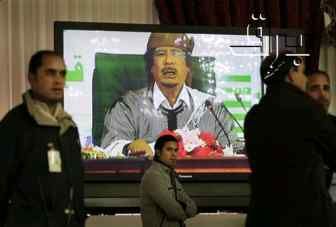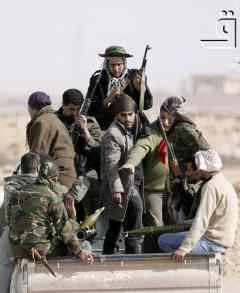| « Obama's Lawless Authorization of Military Commissions Injustice | Wisconsin Democrats Plan Capitulation » |
State Terror Put to the Ultimate Test: Qaddafi’s War on Libya
By Numerian posted by Michael Collins

The extraordinary brutality employed by the Qaddafi regime against its own people has few modern precedents. Dictators tend to reserve their use of state terror for political or sectarian enemies. Saddam Hussein attacked those segments of Iraqi society not content to submit to a government reserved exclusively for Sunni Arabs, and Saddam’s Ba’athist neighbor Hafez al-Assad killed up to 20,000 members of the Syrian arm of the Moslem Brotherhood when they threatened his rule. (Image)
Perhaps the only equivalent instances occurred in Cambodia under the psychotic dictatorship of the Khmer Rouge, and in China during the Tiananmen Massacre. In both cases, the oppression was identified more with the ruling party than with a dictator; China’s government was in fact leaderless following the sudden death of Hu Yaobang, which precipitated the Tiananmen protests. Libya, on the other hand, has been under the unforgiving dictatorship of Muhammar Qaddafi and his family since 1969.
The decision to attack anti-government demonstrators with snipers targeting children, soldiers lobbing artillery shells into crowds, mercenaries wielding swords, and planes strafing civilians, is associated entirely with Qaddafi. He has deliberately chosen to enrage and embitter the entire population of Libya in defense of his dictatorship. How does he expect to win this war against his own people, now determined to resist him with both civil disobedience and guerilla insurrection, and how does he expect to rule if he wins, knowing that in order to survive he must henceforth permanently exercise state terror against the people he “loves”?
Muhammar the Merciless
Given the obvious problems Qaddafi now has in ruling Libya – he can no longer expect the support of the Libyan people much less their affection – why would anyone choose his side in this war? Beyond the opportunism for wealth or power that motivates some people to cast their fortunes with tyrants, Qaddafi has created a government within a government that is fiercely loyal to him and his family. Part of this loyalty is built on tribal identification that is such a prominent feature of Arab societies. Qaddafi’s family comes from one of the largest tribes in Libya, and has been able to use this connection to staff the government with people who can be expected to support the regime under any circumstances.
Even the military has been carved up into the pro-Qaddafi section and everyone else – that is those troops and officers who can be expected to do their job under ordinary circumstances but may not stand side by side with the dictator if asked. This dissection of the military includes the hiring of paramilitary forces from other countries, particularly neighboring African countries like Chad and The Sudan. These men are mercenaries pure and simple, motivated by generous pay, and because of their dark skin, easily identified by Libyans. They may not even speak Arabic, and since they know they will never fit in to Libyan society, they have nothing to protect them but Qaddafi and his money. These are the men who have been allowed to rampage through Tripoli and other cities, hacking to death protestors of either sex and any age, and bystanders who happen to be in the way. They are showering terror on the Libyan population to such a degree that hundreds if not thousands have died, and in Tripoli the people now cower behind closed doors, desperate for food, since commerce has come to a complete halt in the country.
The Emperor’s Taste in Women
At the center of this military-within-a-military structure stands Qaddafi’s Praetorian Guard, composed of 40 women highly trained in weaponry and martial arts, and hand picked by Gaddafi for their determination and beauty. They sign an oath pledging to give their lives to the dictator in his defense, and seven have done so thus far. In public they travel in combat fatigues but also wear lipstick, nail polish, and high heels. They are referred to in Libya derisively as the Amazons, but officially the government refers to them as Nuns, since they also are virgins when selected and are expected to remain celibate.
It is as if Qaddafi is taking lessons from the last great Libyan family to stride upon the world stage: the Severan dynasty, which ruled Rome from 193 to 235. Septimius Severus was the first emperor of Rome born in Africa, and while he was able to bring peace to an empire riven by civil war, he could never tame his own family. His two sons were selected as co-emperors, but as soon as they came to the throne Caracalla slew his brother Geta, setting the stage for his own death eventually at the hands of his Praetorian Guard. Through several generations of Severan successors, assassination or death in battle was the inevitable fate of the emperor.
Qaddafi has similar problems deciding what to do with his sons, who are expected by their father to establish a dynasty to rule Libya for decades. His fourth son Mutassim keeps the lowest profile and serves as the government’s national security advisor. It is he who may be leading the troops loyal to Qaddafi in this current battle for survival. Mutassim has been described as associating with the reactionary and conservative wing of the family, as opposed to his brother Saif al-Islam Qaddafi, who has been pressing for liberal reforms of the economy and an opening to the West. Saif is the public face of the dynasty, attempting to give it a modern and more tolerant look.
It is Mutassim, however, who travels with his father abroad on state visits, handling security matters and dealing with Qaddafi’s bizarre requirements. An entourage aboard three Airbuses travels with Qaddafi wherever he goes, and Qaddafi requires a public park be given over to his private use so that he can erect tents for himself and his aides. On a trip to Italy (Berlusconi is his favorite counterpart) Qaddafi pinned to his uniform a picture of a Libyan resistance fighter in the 1930s being hanged by the Italians. He brought a camel with him on his last trip to Paris, and the schedule of public events and private meetings is often thrown out the window because Qaddafi is so quick to take offense at perceived slights.
A Strategy for Survival
Is Qaddafi a wily operator, a buffoon, or simply a lunatic? The only certainty is that he is not adverse to using oppression to maintain his rule. In the 1970s he personally attended the public hanging of students who protested his policies, so ruthlessness has always been a feature of his government. He has often repeated Mao’s statement that power comes from the barrel of a gun. He will reach for the machete, the artillery round, or the hangman’s noose whenever these are needed to destroy his enemies, who are by his definition also enemies of Libya.
This is the instinct that has made it impossible for Qaddafi to given in to the demands of demonstrators that he quit. He will never act like a Mubarak, in part because there is no monolithic military force to push him out. There is only that part of the military alien to Libyan life and culture which will support Qaddafi to the bitter end, against the other part which feels it must now take up arms against him as the only way to survive. Civil insurrection was almost guaranteed when the mass protests began.
Whether this is a civil war or not remains to be seen. Michael Collins argues below that it is not a civil war, and there is some basis for that conclusion. There is no religious split between Sunnis and Shi’ites that would constitute a sectarian rift as in Lebanon. The tribal support Qaddafi depends upon is not monolithic. There is no aggrieved segment of Libyan society seeking independence. If there is anything monolithic about Libyan society, it is the recently kindled detestation for Qaddafi that must be felt by an overwhelmingly number of Libyans.
Qaddafi has converted himself into a non-Libyan, an outsider – anathema both domestically and abroad. He has his paid supporters and some segment of the military groomed by his son Mutassim to stand by his side. Even then, there are reports that the Qaddafi forces are killing any soldiers in the army who refuse to fire on civilians. This is hardly conducive to good morale, since to survive Qaddafi must maintain the loyalty and obedience of the core military units that are taking the fight to the insurgents. He must have access to military supply caches built up over the years by purchases from the former Soviet Union, and more recently the international arms market. He must have access to oil revenues, which is going to be increasingly difficult now that over 100,000 foreign workers in the oil fields have left (this is the downside of relying on “mercenaries” rather than building up a reliable cadre of Libyan engineers to run the oil and gas wells, refineries and pipelines). He must be able to purchase new military supplies on the illegal market, since governments are going to be loath to sell to him, and this means he must retake the port cities lost to the rebels. More than ever, he is dependent on his sons to manage the rump government, especially since Qaddafi’s quixotic temperament probably means he is unfit to make day to day tactical decisions.(Image)

The insurrectionists have similar problems with access to equipment and ammunition, compounded by the fact that they do not yet have access to oil revenue to continue the insurgency for long on a full military scale. On top of that, the rebel military forces have no cohesive command structure and lack field experience. What the insurrectionists have in their favor is broad public support and the ability to move within the population easily. This makes it more likely that the insurrection will evolve into a guerilla warfare movement, attacking the military command structure of the regime, and the critical infrastructure of the oil industry, such as pipelines, if there is no hope for the rebels to achieve oil revenue on their own (as the Kurds have done in Iraq).
While all this is going on, the population will continue to suffer and a humanitarian crisis looms, especially for Europe. Libya is only 90 miles away from Sicily, and the exodus of refugees has already begun. It is in the interest of Europe and the Arab League countries that Qaddafi and his family leave as soon as possible, and efforts are no doubt underway behind the scenes to offer him a place of permanent asylum with access to some of his stolen wealth.
Which brings us back to whether Qaddafi is cagey and willing to wrangle the best possible deal for himself, or whether he is a fanatic willing to bring all of Libya down with him. If he is a fanatic, then the Chinese and Iranian governments, to name a few, will have an interest in seeing how this plays out. Can a government despised by its own people and robbed of all legitimate right to rule maintain power through the sheer and constant application of state terror?
First published in The Agonist


